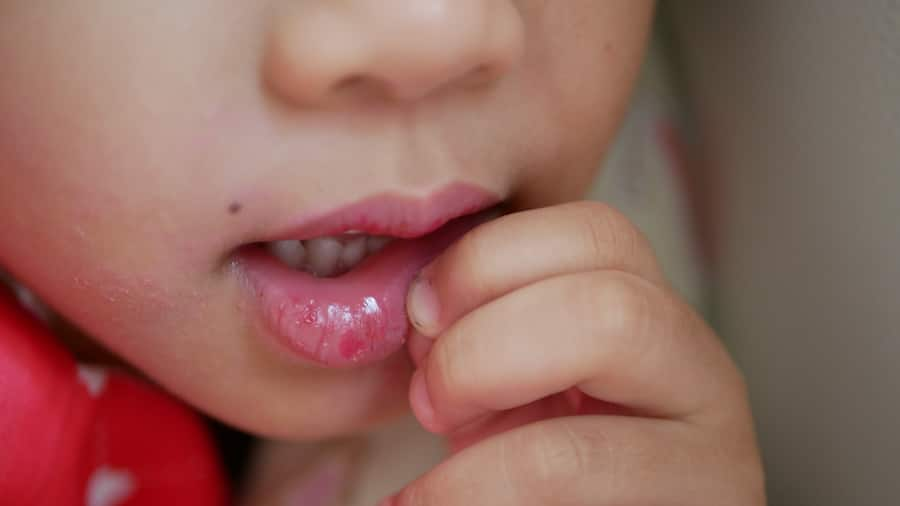What Are Mouth Ulcers?
Mouth ulcers, also known as aphthous ulcers or stomatitis, are small, shallow lesions that form on the soft tissues inside the mouth. The two primary forms of stomatitis are:
Herpes stomatitis: a cold sore caused by the herpes simplex virus (HSV) that typically infects young children between six months and five years old
Aphthous stomatitis: a canker sore that is much more common in young people, most often between 10 and 19 years old
Mouth ulcers are often white or yellow in the centre, surrounded by a red, inflamed area. They can appear on the tongue, gums, lips, or inside of the cheeks. Unlike cold sores, which occur on the outer surface of the lips, mouth ulcers are not contagious. Various internal factors generally trigger them.
While mouth ulcers can develop in people of all ages, children may be more prone to them due to their delicate oral tissues and developing immune systems. In most cases, mouth ulcers in kids heal on their own within a week or two. However, they can be painful and interfere with daily activities like eating, talking, or brushing teeth. It's crucial to recognise the signs of mouth ulcers early so you can take steps to relieve your child's discomfort and prevent further irritation.
Common Causes of Mouth Ulcers in Kids
Understanding what causes mouth ulcers in kids can help you prevent them from happening frequently. Several factors can trigger the development of mouth ulcers in children:
Accidental Injuries: One of the most common causes of mouth ulcers is physical trauma inside the mouth. Kids often accidentally bite their tongue or cheeks while chewing, especially when teething or just learning to eat solid foods. Similarly, brushing too hard or using a toothbrush with hard bristles can cause a mouth injury to the delicate tissues inside, leading to ulcers.
Food Sensitivities: Certain foods, particularly acidic or spicy foods, can irritate the mouth’s lining and trigger ulcers. Common culprits include citrus fruits (like oranges and lemons), tomatoes, vinegar, and spicy snacks. Food allergies can also cause similar reactions in some children.
Stress: Emotional stress or anxiety can cause a weakened immune system, making the child more susceptible to mouth ulcers. This is particularly common in older kids who may experience school-related stress, family changes, or social interactions.
Nutritional Deficiencies: A lack of essential vitamins and minerals can contribute to developing mouth ulcers in kids. Deficiencies in vitamins B12, zinc, iron, and folic acid are often linked to recurrent ulcers. Ensuring your child has a balanced diet rich in these nutrients can help reduce the frequency of ulcers.
Viral Infections: In some cases, viral infections such as hand, foot, and mouth disease (caused by the coxsackievirus) or herpetic gingivostomatitis (caused by the herpes simplex virus) can lead to mouth ulcers. These ulcers tend to be larger and more painful than those caused by other factors.
Underlying Medical Condition: Certain autoimmune disorders, like celiac disease or Crohn's disease, and inflammatory bowel disease can also manifest as recurrent mouth ulcers in children. If your child frequently develops ulcers without a clear cause, it’s worth discussing this possibility with a healthcare provider.
Understanding the underlying cause of your child’s mouth ulcers can help you choose the most effective treatment and prevention strategies.
Signs and Symptoms of Mouth Ulcers in Kids
Mouth ulcers in kids are typically easy to spot due to their appearance and the discomfort they cause. Here are some of the common signs and symptoms that may indicate your child has a mouth ulcer:
Small Sores: The most obvious symptom is the presence of one or more small, round sores inside the mouth. These mouth sores are often white, yellow, or grey in the centre with a red, inflamed border.
Pain and Discomfort: Children with mouth ulcers may complain of pain, especially when eating, drinking, or talking. The severity of the pain can vary depending on the size and location of the ulcers.
Swelling: The area around the ulcer may become swollen and tender to the touch. This can make it difficult for your child to brush their teeth or chew food.
Loss of Appetite: Due to the pain caused by the ulcers, your child may be reluctant to eat or drink, which can lead to temporary weight loss or dehydration if the ulcers persist.
Irritability: Younger children, especially toddlers, may become fussy or irritable when they have mouth ulcers, as they may be unable to communicate their discomfort effectively.
If your child develops other symptoms, such as a fever, swollen glands, or ulcers that do not heal within two weeks, it’s a good idea to consult a doctor to rule out any underlying health issues.
Effective Treatment Options for Mouth Ulcers in Kids
When it comes to mouth ulcer treatment for kids, several approaches can help alleviate pain and speed up the healing process.
Topical Gels or Ointments
There are several over-the-counter gels and ointments available that can be applied directly to mouth ulcers to numb the area and reduce pain. These products often contain ingredients like benzocaine or lidocaine, which provide temporary relief from discomfort. Be sure to choose a safe product considering your child’s age, and follow the dosage instructions carefully.
Mouth Rinses
For older children capable of swishing and spitting, a medicated mouth rinse or mouthwash may help reduce inflammation and promote healing. Some mouth rinses contain antiseptic or anti-inflammatory agents that can prevent infection and soothe irritation.
Pain Relief Medications
If your child is in significant pain, you may want to consider giving them a mild pain reliever, such as ibuprofen or acetaminophen, to help manage their discomfort. Always check with your child’s paediatrician before administering any mouth ulcer medicine for baby, especially if they are under two years old.
Home Remedies to Soothe Mouth Ulcers in Kids
In addition to over-the-counter treatments, there are several natural home remedies for mouth ulcers in kids that can help soothe them and promote faster healing:
Honey: It is known for its natural antibacterial and anti-inflammatory properties. Applying a small amount of honey to the ulcer can help reduce pain and speed up the healing process.
Coconut Oil: Using coconut oil is another popular home remedy for mouth ulcers due to its antimicrobial and anti-inflammatory properties. Applying coconut oil to the affected area can provide relief and prevent the ulcer from becoming infected.
Aloe Vera Gel: Applying a small amount of pure aloe vera gel to the ulcer can help reduce pain and promote healing because of its soothing and healing properties. Be sure to use a natural, unscented aloe vera product that is safe for oral use.
Cold Compress: A cold compress or ice cube applied directly to the ulcer can help numb the area and reduce swelling. This is especially helpful for children who are experiencing significant pain or discomfort.
Tips for Preventing Mouth Ulcers in Children
While mouth ulcers in toddlers can’t always be prevented, there are several steps you can take to reduce the likelihood of your child developing them.
Avoid Trigger Foods: If certain foods seem to trigger mouth ulcers in your child, try to avoid them or limit their intake. This includes spicy, acidic, or rough-textured foods that can irritate the mouth’s lining.
Ensure Proper Nutrition: Make sure your child is getting a well-balanced diet rich in vitamins and minerals, especially vitamin B12, iron, and zinc. A deficiency in these nutrients can increase the likelihood of mouth ulcers.
Hydration: Encourage your child to drink plenty of water throughout the day to keep their mouth hydrated, as a dry mouth can increase the risk of ulcers.
Maintain Good Oral Hygiene: Encourage your child to brush their teeth gently and regularly to prevent irritation and injury inside the mouth. Be sure to use a soft-bristled toothbrush and non-irritating toothpaste designed for young children.
A gentle, child-friendly toothbrush can make all the difference in maintaining oral hygiene and keeping your child’s mouth healthy. The Colgate Toothbrush for Kids (0-2 years) is explicitly designed for toddlers just starting to learn how to brush. Its extra-soft bristles gently clean your child’s developing teeth without irritation. Its small head ensures easy access to every corner of the mouth, making brushing comfortable and effective for your little one.
Conclusion
Mouth ulcers in kids can be uncomfortable and worrying, but they are usually not a cause for serious concern. By understanding the common causes, symptoms, and treatment options, you can help your child manage their discomfort and heal quickly. Home remedies and maintaining oral health can also go a long way in preventing future outbreaks. If your child’s mouth ulcers persist, consult a healthcare professional to rule out any underlying health issues.
Frequently Asked Questions
1. What deficiency causes mouth ulcers in kids?
Key nutrient deficiencies, such as vitamin B12, iron, zinc, and folic acid, can lead to mouth ulcers in kids. These nutrients are vital for healthy cells and a strong immune system. Rapid growth or dietary changes may increase the risk of deficiencies, so children need to have a balanced diet rich in these vitamins and minerals to help prevent frequent mouth ulcers.
2. What not to eat with mouth ulcers?
Avoid acidic foods like citrus fruits, tomatoes, vinegar, and spicy or salty snacks when your child has mouth ulcers. These can irritate and inflame the sores, worsening the pain. Rough-textured foods like chips or toast should also be avoided since they can scrape against the ulcer and delay healing.
3. How long do mouth ulcers usually last in toddlers?
Mouth ulcers in toddlers typically last about 7 to 10 days and usually heal on their own. The pain may lessen after a few days, but full recovery can take up to two weeks. If the ulcers persist for more than two weeks, keep recurring, or if your child shows other symptoms like fever or swollen glands, consult a doctor for medical advice.
4. Do mouth ulcers indicate a serious health issue in children?
Most mouth ulcers in children are not serious and result from minor issues like biting the inside of the mouth, stress, or vitamin deficiencies. However, recurrent or long-lasting ulcers may indicate underlying health conditions, such as autoimmune diseases or bacterial infections. If the ulcers do not heal within two weeks or come with other symptoms like fever or swollen glands, consult a doctor.
This article is intended to promote understanding of and knowledge about general oral health topics. It is not intended to be a substitute for professional advice, diagnosis or treatment. Always seek the advice of your dentist or other qualified healthcare provider with any questions you may have regarding a medical condition or treatment.
ORAL HEALTH QUIZ
What's behind your smile?
Take our Oral Health assessment to get the most from your oral care routine
ORAL HEALTH QUIZ
What's behind your smile?
Take our Oral Health assessment to get the most from your oral care routine








.jpg)




